

20 Things Every Future Foreign Exchange Student Should Know. My wife's job has her in constant communication with Europeans via the phone and internet, and it's quite common for her to have conversations with people regarding their personal lives.

Several times within the last year she's been able to talk with parents who have a child preparing to be a foreign exchange student; a topic she is intimately knowledgeable of, having been a year-long student in Spain herself during the 1980s. Following her last conversation, my wife asked me to write an article discussing helpful things future exchange students and their parents should know. Using her experience from Spain, as well as our shared experience hosting several exchange students, I offer you these twenty things every foreign exchange student, his parents, and his hosts should know.
Cultural Differences. Cultural Differences. In 1993, I had my first opportunity to visit Russia as a representative of the University of California.
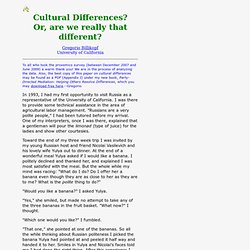
I was there to provide some technical assistance in the area of agricultural labor management. "Russians are a very polite people," I had been tutored before my arrival. One of my interpreters, once I was there, explained that a gentleman will pour the limonad (type of juice) for the ladies and show other courtesies. Toward the end of my three week trip I was invited by my young Russian host and friend Nicolai Vasilevich and his lovely wife Yulya out to dinner. At the end of a wonderful meal Yulya asked if I would like a banana. "Would you like a banana? " "Yes," she smiled, but made no attempt to take any of the three bananas in the fruit basket. "Which one would you like? " "That one," she pointed at one of the bananas. "Oh no, Grigorii Davidovich," a Russian graciously corrected me. The impact of international students on domestic students and host institutions.
The review was commissioned by the Ministry of Education to inform policy development and effective planning in the area of international education, particularly with respect to full fee-paying students.
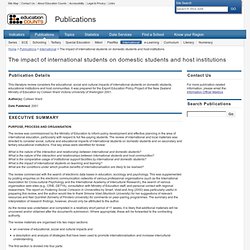
Www.nafsa.org/uploadedFiles/NAFSA_Home/Resource_Library_Assets/Publications_Library/u.s.pdf?n=1388. CF 14.2: “A Genre Approach to Writing Assignments” by Irene Clark. Composition Forum 14.2, Fall 2005 Irene Clark In their recent article, “Materiality and Genre in the Study of Discourse Communities,” Devitt, Bawarshi, and Reiff maintain that genre analysis can enable outsiders to a discourse community “to connect what community members know and do with what they say and how they say it—their language practices” (542).
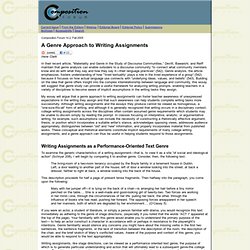
Genre analysis, the article emphasizes, fosters understanding of how “‘lived textuality’ plays a role in the lived experience of a group” (542) because it focuses on how actual language use connects with “underlying ideas, values, and beliefs” (543). Building on the idea that genre offers insight into the complex interrelationship between language and community, this essay will suggest that genre study can provide a useful framework for analyzing writing prompts, enabling teachers in a variety of disciplines to become aware of implicit assumptions in the writing tasks they assign.
Explore Strategies - Enhancing Education. Students are encountering linguistic and cultural obstacles to writing.
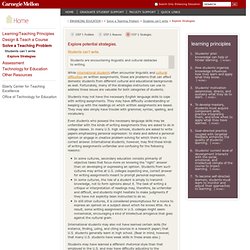
While international students often encounter linguistic and cultural difficulties on written assignments, these are problems that can affect domestic students from different cultural and educational backgrounds as well. Fortunately, many of the strategies instructors can use to address these issues are valuable for both categories of students. Students may not have the necessary English language skills to cope with writing assignments. They may have difficulty understanding or keeping up with the readings on which written assignments are based. They may also simply have trouble with grammar, syntax, spelling, and vocabulary. Even students who possess the necessary language skills may be unfamiliar with the kinds of writing assignments they are asked to do in college classes.
By the same token, acceptable communication styles may be more direct or less direct in some cultures than in the U.S. Assessing Student Learning - tips for new staff. 7.
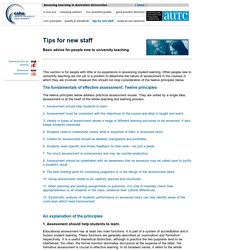
Too much assessment is unnecessary and may be counter-productive. In setting an assessment regime for any subject, academic staff need to be aware of students' overall workload - and, as far as possible, the deadlines for other subjects they may be doing. A very heavy assessment load does not allow students time to comprehend and explore material: it tends to push them into shallow, rote approaches to study, where they try to find shortcuts and formulae for tasks, without really understanding underlying principles. If students are faced with too much 'busywork', particularly if this involves a repetitive approach, they are likely to lose interest and motivation. As suggested above, there is no need to keep asking students to demonstrate a particular skill. 8.
It is important for universities that their assessment practices are transparent and demonstrably fair and reasonable, especially when assessment is associated with professional accreditation. Media/2010/08/Yamazaki_and_Kayes.pdf. ERIC PDF Download. Www4.ncsu.edu/unity/lockers/users/f/felder/public/Papers/Understanding_Differences.pdf.